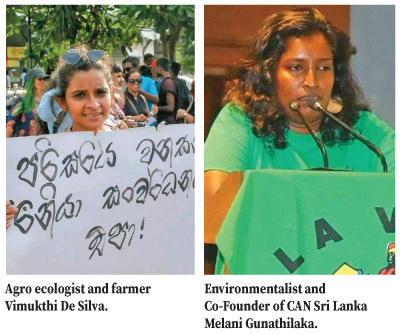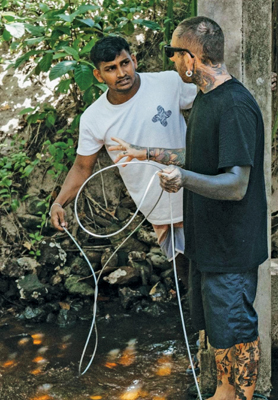Many parts of the island were affected by severe inclement weather last week. It had been just weeks before Sri Lanka experienced soaring high temperatures which prompted advisories from the Health Department.
The extreme weather isn’t merely an inconvenience; it resulted in several fatalities in the past week with significant damage to public and private property. Although weather extremes are quickly dismissed as something to do with ‘El Nino’, there are studies suggesting that global heating may lead to stronger ENSO (El Nino Southern Oscillation) events.
However, it also has a domino effect, as terrible as immediate natural disasters can be to a country like Sri Lanka’s, climate change will create significant setbacks to our socio-economic development that begs an immediate course of action.
Ever since the need has been emphasised, timely legislation had driven efforts to protect the environment. These had come in Acts and Agreements signed by the State and non-State actors.
 The Montreal Protocol, finalised in 1987, has been successful in phasing out the use of ozone-depleting substances, contributing to the recovery of the ozone layer and protecting life on Earth from harmful UV radiation. Countries have significantly reduced the use of Mercury after the Minamata Convention was enforced in 2017.
The Montreal Protocol, finalised in 1987, has been successful in phasing out the use of ozone-depleting substances, contributing to the recovery of the ozone layer and protecting life on Earth from harmful UV radiation. Countries have significantly reduced the use of Mercury after the Minamata Convention was enforced in 2017.
The Paris Agreement, adopted in 2015, has stimulated significant investment in renewable energy, energy efficiency, and clean technologies. This shift is driving the transition away from fossil fuels and promoting sustainable economic growth.
However, there is also the factor of engaging with grassroots and paying attention to ground reality before monumental pacts and laws are signed. Climate change affects the Global South disproportionately even though developing nations contribute far less in emissions to that of the Global North. It is imperative that Sri Lanka’s most vulnerable groups and areas are safeguarded against challenges that will emerge from climate change like food and water security.
At the recent Sri Lanka Climate Summit, hosted by the Ceylon Chamber of Commerce, President Ranil Wickremesinghe said that the Government is drafting a new law to address environment and climate change issues. The legislation aims to transform Sri Lanka into a low-emission, climate-resilient economy, with a focus on achieving net-zero emissions by 2050.
Key elements of the proposed law include the establishment of a Climate Change Centre alongside the Central Environment Authority, and it is modelled after the UK’s Climate Change Act. The new framework will integrate green financing and emphasise the importance of transitioning to a competitive, export-oriented economy.
Green economy
The President highlighted the necessity for policy reforms to promote a green economy, involving all sectors simultaneously due to the country’s manageable size. The summit’s theme, “Climate Action for our Nation and the Planet,” underscores the urgency of adapting to and combating climate change, with the goal of making Sri Lanka a regional leader in sustainable development.
The UK’s Climate Change Act, enacted in 2008, is a significant piece of legislation aimed at addressing climate change and reducing greenhouse gas emissions. Key points in the act include legally binding targets, carbon budgets and the establishment of a Committee on Climate Change.
The act also includes adaptation measures where the UK Government is required to assess climate change risks to the country and prepare a National Adaptation Program to address these risks. The UK’s Climate Change Act has been influential globally, and had inspired other countries to adopt similar legislative frameworks for climate action like Sweden, New Zealand, Denmark and France.
A paper published in 2020 titled ‘The impact of strategic climate legislation: evidence from expert interviews on the UK Climate Change Act’ showed that a strong legal framework with statutory targets, processes and institutions can be an important tool for effective climate change governance and a broad-based framework law can make action on climate change more predictable, more structured and more evidence-based.

Sumudu Nirmala and Island Tattoo Connection’s Roberto Trupiano installing river strainers in Ahangama, Sri Lanka.
However, while the Act has succeeded in creating a more informed and forward-looking policy process, concerns remain about its long-term certainty and protection against political changes.
Sri Lanka’s current national climate change policy aims to tackle climate change, focusing on both adaptation and mitigation within sustainable development frameworks. Its objectives include raising awareness, implementing adaptive measures to protect people, livelihood and ecosystem, reducing greenhouse gas emissions, and promoting sustainable consumption.
Despite Sri Lanka’s low carbon footprint and highly vulnerable status, Sri Lanka has committed to increase its forest cover by 32 percent by 2030 and reduce greenhouse gas emissions by 14.5 percent, according to the country’s Nationally Determined Contributions submitted to the United Nations to Framework Convention on Climate Change in 2021.
Environmental activist and co-founder of Climate Action Now Sri Lanka, Melani Gunathilaka said that drafting a Climate Change Act in Sri Lanka should be done by consulting grassroots organisations, especially farming, plantation and fisher communities since their livelihoods are intertwined with the natural environment and are more affected by climate patterns firsthand.
Making policies in air-conditioned offices is not useful, she said before sharing her opinion on the UK’s Climate Change Act. “It doesn’t sound like a practical idea since the UK and Sri Lanka are quite different in many ways, not just in environment and climate. The UK is an industrialised nation while Sri Lanka is not.
Practical idea
This plan’s endorsement by financial institutions is very concerning, since we should draft policies compatible with Sri Lanka’s environment and socio-economic conditions. We shouldn’t be doing it to please our creditors and financial organisations which will only worsen the issue.”
She said that climate change shouldn’t be looked at as a profit-making avenue, but instead be looked at as a problem that needs solving for future generations and well-being of the natural environment. “The problem when it comes to adoption and mitigation, we seem to be spending a lot on adaptation and zero on mitigation. Also the majority of our understanding is only on carbon emissions but that is just one part of several factors that contribute to climate change”.
Protecting biodiversity and food security requires holistic solutions, she said. “Sri Lanka had ancient technology that worked and still works. For example we have a good water conservation system but it seems we are going ahead with whatever popular solutions presented by the West instead of our own methods or consulting our own people.
Gunathilaka says the problem needs to be looked at with respect to the debt crisis. “Majority of the countries experiencing debt crises are in the Global South which are victims of climate change while contributing little to the problem. Ideally we should be looking at just and sustainable solutions; not ones that make our creditors happy or financial institutions or bigger emitters happy. Big companies ‘greenwash’ their brands via sustainable initiatives, which is only discouraging local brands and businesses who are genuinely making efforts to be sustainable.
Agro ecologist and farmer Vimukthi De Silva, who is part of the Movement for Land and Agricultural Reform and La via Campasina member, said there is less attention paid in the policy level to ground realities. Small-scale farmers like us are eclipsed by industrial farms but you should understand that we produce more than 70 percent of food for the planet. Consumer society is totally dependent on market-related agriculture like mono-cropping. We call them green deserts because these crops don’t contribute to biodiversity”.
If real ground work needs to be done, we need to consider the importance of biodiversity, De Silva said adding that there is a dire need to change the pattern of agriculture like agro-forestry. “Industrial maize is one of the many reasons for deforestation, corn grown large-scale to feed chickens and not humans; the whole process generates a lot of waste. There is so much land-grabbing to continue this form of industrialised farming and this is getting worse in the Global South”.
I asked De Silva about Sri Lanka’s catastrophic failure when it tried to radically adopt organic farming and if we really need alternative farming methods for a country recovering from a financial crisis. “The previous regime didn’t do any groundwork before banning agrochemicals. They tried to compel people into adopting organic farming, now the people are too exhausted to try anything new after experiencing that failure,” she said while adding that things like this cannot happen overnight and not without leaving the grassroots out of the equation.
Meanwhile, there are those who are taking proactive measures to save the planet. Non-profits and grassroots collectives are true frontline heroes in this battle. The Island Tattoo Connection (ITC) is one such example. The ITC is a collective of famous international tattoo artists striving to raise awareness on the environment. In 2019, the ITC, collaborating with local foundations, bought a plastic recycling machine for a small town in Bali, Indonesia. In 2022, the collective installed river strainers in Ahangama, Sri Lanka with the help of local partners and international tattoo artists.
One of the founders of ITC Roberto Trupiano said that beyond the river strainers, the organisation also works with local businesses in tourist hotspots in the Global South to implement sustainable practices like waste management to educating tourists.
Encourage investments
“We also advocate for policy changes that support sustainable tourism infrastructure and encourage investments in eco-friendly projects. By leading these initiatives, we aim to set a standard for others in the industry to follow. Trupiano says that local communities will witness transformation and economic opportunities will grow if sustainable tourism is fully embraced, in a manner that preserves the environment and respects local cultures. “This approach ensures that tourism does not exploit but enriches, offering a model where everyone benefits – a brighter cleaner and more sustainable future for all.”
Sri Lanka faces urgent climate challenges, highlighted by recent extreme weather. New legislation modelled after the UK’s Climate Change Act aims to address these issues, but it must be adapted to local conditions.
Grassroots involvement is crucial. Local insights emphasise the need for inclusive and sustainable solutions, as shown by the failure of the organic farming initiative.
Efforts like those by the Island Tattoo Connection demonstrate the power of community-driven environmental conservation. By promoting sustainable tourism and waste management, they set a positive example.
For a climate-resilient future, Sri Lanka must align national policies with grassroots realities, ensuring sustainable and equitable solutions. This collaborative approach can transform climate challenges into opportunities.









